Hei Mahi MāraThe benefits of real food
Dec 23, 2015

A beginner’s guide to growing organic vegetables
nā Tremane Barr
 Summer is my favourite time of the year because of the warm sunshine and the tasty treats that come with it from the māra. However, this season has been a bit of a challenge as I bought in some new soil from a landscape garden centre to finally round out the new garden area, which had been a bit uneven. Even though this soil was mixed 50/50 with organic compost, I think in hindsight it was more of a clay subsoil than fertile top soil. Initially this resulted in stunted plant growth and a plague of aphids, which was a bit of a shock to me as I am used to working with fertile soil where the plants grow quickly and vibrantly, with no need to engage in direct pest control such as spraying. In late spring and early summer I have had to use Kiwicare’s Organic Super Spraying Oil to keep aphids under control, and have planted extra alyssum, as the flowers help attract predators of aphids. This also necessitated the need for extra organic compost, and liquid fertiliser at least a couple of times a week when ordinarily I would only use it once a week.
Summer is my favourite time of the year because of the warm sunshine and the tasty treats that come with it from the māra. However, this season has been a bit of a challenge as I bought in some new soil from a landscape garden centre to finally round out the new garden area, which had been a bit uneven. Even though this soil was mixed 50/50 with organic compost, I think in hindsight it was more of a clay subsoil than fertile top soil. Initially this resulted in stunted plant growth and a plague of aphids, which was a bit of a shock to me as I am used to working with fertile soil where the plants grow quickly and vibrantly, with no need to engage in direct pest control such as spraying. In late spring and early summer I have had to use Kiwicare’s Organic Super Spraying Oil to keep aphids under control, and have planted extra alyssum, as the flowers help attract predators of aphids. This also necessitated the need for extra organic compost, and liquid fertiliser at least a couple of times a week when ordinarily I would only use it once a week.
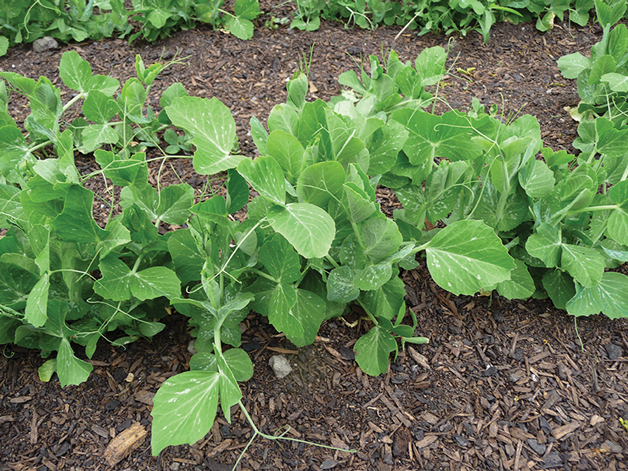
Peas
I found I had the same problems when I first started gardening at our property 20 years ago, but as the soil pH, organic matter, and fertility increased over time, the plant growth rates improved and the pest problems naturally disappeared. This initial phase of establishing a new māra where challenges like this can arise can be discouraging for a new gardener, but with patience and a focus on increasing soil fertility (compost, lime, and minerals), plants will soon begin to thrive without pests or diseases and the need to control them with sprays (organic or otherwise).
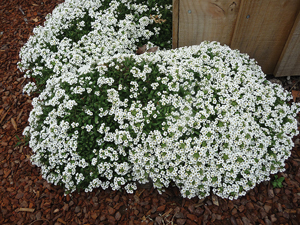
Alyssum
This is because plants have inbuilt defence mechanisms to help ward off pests and diseases. One expression of this is found in the phytonutrients that they produce, which account for the bitter taste in vegetables and fruit. These phytonutrients are designed to make the plant unpalatable to those organisms that would eat the plants, from bacteria, to insects, to plant eaters like ourselves. Phytonutrients have a bitter taste to the human palate, and because of this some people do not like vegetables so much, and have a preference for sweeter food instead.
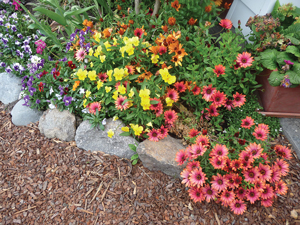
Pansies
Thousands of different types of phytonutrients have been identified in vegetables and fruits, and while they can be toxic in very high doses, when they are consumed as part of a food lifestyle high in vegetable and fruit content, they are vital to human health. This is because these bitter phytonutrients provide a wide range of health-enhancing chemicals that can combat all sorts of ills, like cancer and inflammation, for example, by triggering the expression of antioxidant genes that help protect the body.
New vegetable and fruit varieties are losing the bitter phytonutrients so necessary for maintaining human health, and in the process turning healthy food into junk food.
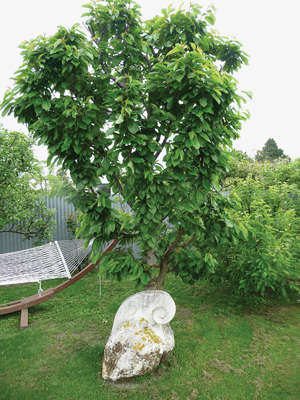
Cherry tree
That’s the good news. The bad news is that modern plant breeding focuses on removing these bitter phytonutrients to make the food more sweet, and therefore more palatable to the masses.
Tests comparing modern potato cultivars with traditional Māori ones showed that rīwai contain six to ten times more antioxidants, protein, essential amino acids, and minerals than their modern counterparts.
In effect, new vegetable and fruit varieties are losing the bitter phytonutrients so necessary for maintaining human health, and in the process turning healthy food into junk food.
A side effect of this breeding process has also resulted in a similar reduction in the mineral and vitamin content of vegetables and fruit. For example, the traditional Lebanese cucumber contains almost twice the amount of vitamin C and vitamin A than the modern telegraph varieties. However, to one degree or another humans have been selecting the sweeter varieties since we first started cultivating plants thousands of years ago. It is just that since the 1950s, this process has been greatly accelerated through modern breeding techniques. Coupled with industrial agriculture’s depletion of soil mineral fertility and the corresponding increase in toxic pesticides, this looks to me like a slow-moving disaster of potentially massive proportions for the collective health of humanity.
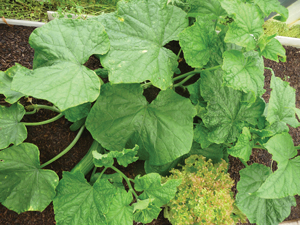
Lebanese cucumber
From my experience of dealing with pancreatic cancer for the past three-and-a-half years and still slowly getting healthier (despite an average 95% death rate within five years of diagnosis for all pancreatic cancers), the foundation of my recovery has been getting the vitamins, minerals, amino acids, and phytonutrients necessary via the food I eat to support my body’s immune system, which then does the real healing of the cancer.
The good news is that we are not powerless in the face of the industrial food system, so long as we are willing to pick up a spade and make the effort to grow what we can in our own back yard (or buy certified organic foods). It is empowering to draw on the knowledge that the older varieties of vegetables and fruits, when grown organically, contain the vital nutrition we require to keep our bodies healthy and immune systems working effectively.
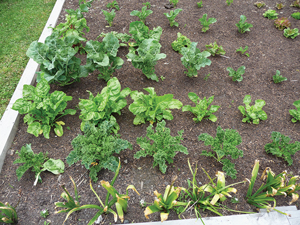
Kale
Usually, mid-summer is the time I start to re-sow new plantings of lettuce, celery, spring onions, radishes, and French beans. And I think about the vegetables I want to harvest in autumn and winter. For example, leeks need to be planted mid to late January to get an early start so they can bulk up before winter. Around this time, the rīwai start getting harvested, and this makes room for planting kale, silver beet, spinach, broccoli, cabbage, and Brussels sprouts.
Let food be thy medicine and medicine be thy food – Hippocrates.
Websites
Benefits of taewa:
Nutritional properties of various vegetables:
http://www.vegetables.co.nz/select_a_vegetable/
Killer T Cell: The Cancer Assassin:
https://www.youtube.com/watch?v=ntk8XsxVDi0
The Truth About Cancer – dietary and environmental factors:
http://thetruthaboutcancer.com
Tremane Barr is Ngāi Tahu/Kāti Māhaki ki Makaawhio. He has been gardening organically for more than 20 years. Tremane is currently a Research Fellow based at the Ngāi Tahu Research Center at the University of Canterbury and is working on the Raumanga Rōnaki Mahinga Kai project.